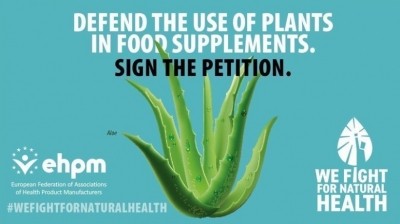EC’s plant preparation stance ‘abandons botanical ambitions,’ says regulatory expert

In a newly published document, study findings revealed that currently, the objectives of the Claims Regulation had not been ‘fully attained,’ with current rules not accounting for specific plant preparations.
Despite the EC’s reluctance, the report’s closing comments left the door open with further exploration of the term ‘traditional use,’ deemed appropriate as was more work looking into botanical harmonisation.
“In the light of the shortcomings highlighted above about the smooth functioning of the internal market and the possible openness to the notion of 'traditional use' to substantiate health claims on plants and their preparations, there are merits for further studying the potential harmonisation of the field of plants and their preparations, including the safety aspect,” the evaluation concluded.
The decision to delay any meaningful action to the deadlock over botanical health claims, did not sit well with industry observers, who have expressed frustration over the long-running saga.
"The Commission should make sure to take into account the importance of the food supplement sector across the EU,” said Luca Bucchini, an expert in food and food supplement regulation.
“An approach that lacks balance - focussed on restrictions only, with no better rules on claims or to support the single market - would not be coherent with taking care of the interests of European consumers and the EU economy as a whole.
“It is particularly galling that the Commission has abandoned all ambition on botanicals which represent such an important sector for innovation and growth across the EU,” said Bucchini, the Managing Director of Hylobates Consulting
“This is important at the political level but at all levels where poorly planned regulations or regulatory actions undermine the trust in the Commission's actions."
Vitamins and minerals
The evaluation also attempts to assess progress in establishing profiles for nutrients such as vitamins and minerals in food supplements.
The report came to similar conclusions saying that specific objectives pursued by setting nutrient profiles was still ‘pertinent’ and ‘necessary’ to meet regulation objectives, with the setting of nutrient profiles ‘needing to be further considered.’
The findings contrast with a response by the EC to a question posed in the European Parliament in April.
When asked about limited EU harmonisation of supplements’ compositional requirements and the resulting fragmentation due to differing national legislation, the EC’s Health and Food Safety Commissioner Stella Kyriakides said, “In 2020, the Commission resumed work on the harmonisation of maximum amounts of vitamins and minerals present in food supplements.
“The intention was to adopt a Commission Regulation to set maximum amounts of vitamins and minerals in food supplements.
“To underpin this work, the European Food Safety Authority will be mandated to update the tolerable upper intake levels of specific vitamins and minerals.
‘Monacolins and Hydroxyanthracenes’
She added that the Commission does not plan to launch other initiatives on food supplements but when need be, “initiates the procedure of Article 8 of Regulation (EC) No 1925/2006 on the addition of vitamins and minerals and of other substances to food to prohibit, restrict or place under Union scrutiny the use in food of a substance other than vitamins or minerals for which safety concerns have been raised.”
The negative agenda of the EC’s report was further compounded as it was revealed any discernible action was restricted to the banning or limiting of substances such as monacolin K.
“To date, a full risk assessment has been launched for two substances’ use in foods - Monacolins derived from red yeast rice and Hydroxyanthracene derivatives - and for three substances – Yohimbe, Ephedra herb and its preparations and Green tea catechins, particularly (-)-epigallocatechin-3-gallate (EGCG).”
“For all substances, it should be noted that EFSA, in its scientific opinion, highlighted several potential problems in relation to risks to human health.
“Due to the scarcity of data originating from use of the substances in the food sector, the scientific opinions highlighted many uncertainties,” the report added.
“In 2015 and 2019, the Commission prohibited the use in foods in the EU of Ephedra species and Yohimbe, respectively. A final decision has not yet been taken for the other substances.”
Concerns were recently voiced at April’s High-Level Food Supplements Conference, where member states expressed the lack of cohesion and disjointed thinking was hindering efforts to provide a better framework for food supplements.
Calling on the 27 member states to take a demanding and coordinated approach, Portuguese Minister of Agriculture, Maria do Céu Antunes said, “Considering the relevance of the food supplement sector, it matters that we are increasingly demanding and capable of working together, with a multidisciplinary approach, to tackle the issues and overcome certain constraints, in order to facilitate the provision of a framework.”














